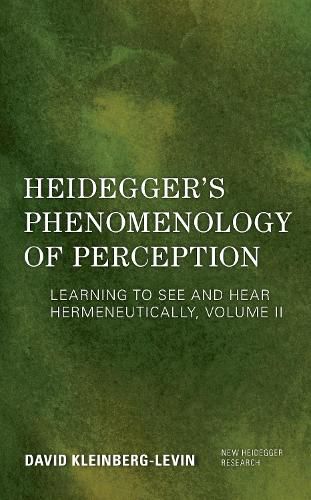Readings Newsletter
Become a Readings Member to make your shopping experience even easier.
Sign in or sign up for free!
You’re not far away from qualifying for FREE standard shipping within Australia
You’ve qualified for FREE standard shipping within Australia
The cart is loading…






In volume I, Kleinberg-Levin interprets and defines the five key words in Heidegger’s project. In this second volume, he makes use of these words, illuminating their specific concrete meaning and significance for Heidegger’s phenomenology of perception and his philosophy of history. At stake in Kleinberg-Levin’s project, coming after Heidegger, is the possibility of another experience and understanding of being. Concentrating on the appropriation of seeing and hearing as capacities and capabilities bearing promising potentialities that could be developed, he shows how these modes of perception should be understood in the context of Heidegger’s critique of the history of metaphysics, wherein vision has served as paradigm for knowledge, truth, and reality. He also shows that seeing and hearing need to be understood in the context of Heidegger’s philosophy of history, in which seeing and hearing are both given a role in the transformation of the character of our humanity, redeeming their own inherent potential. Kleinberg-Levin shows how and why, in the world of today, the formation of the perceptual Gestalt has undergone an accelerating process of deformation and reification, encouraging a disposition for violence that makes perception serve unrelenting technological and technocratic imperatives; and he shows how we might begin to redeem the promising potential in seeing and hearing, turning their damaged and dehumanized character, and their violence, into ways of taking part in the creation of a new planetary existence-what Heidegger imagines through the topology of the fourfold, the gathering of earth and sky, mortals and their gods, around all the things we live with. Retrieving the latent potential in our seeing and hearing for the sake of a better, more benevolent world, another epoch in the history of being, Kleinberg-Levin proposes important new ways to experience and think about the fundamental disposition of these capacities and capabilities, emphasizing our responsibility, not only for the beings that pass through our world, but for being itself, namely, the opening of a perceptual field, a universe of discourse, a world: the necessary conditions for experiencing beings in regard to their being. This responsibility, he argues, summons us to the response-abilities befitting our true humanity. Thus, the subtitle for this volume: Learning to See, Learning to Hear. Concentrating on the development of our natural capacities, Kleinberg-Levin explores the question of our potential for growing in our humanity, growing in our sense of what it means to be human. In this way, he connects his thinking, after Heidegger, not only to the history of European thought, but also to the philosophical contributions of Emerson and Dewey, the best among the Americans to continue the Enlightenment Project.
$9.00 standard shipping within Australia
FREE standard shipping within Australia for orders over $100.00
Express & International shipping calculated at checkout
In volume I, Kleinberg-Levin interprets and defines the five key words in Heidegger’s project. In this second volume, he makes use of these words, illuminating their specific concrete meaning and significance for Heidegger’s phenomenology of perception and his philosophy of history. At stake in Kleinberg-Levin’s project, coming after Heidegger, is the possibility of another experience and understanding of being. Concentrating on the appropriation of seeing and hearing as capacities and capabilities bearing promising potentialities that could be developed, he shows how these modes of perception should be understood in the context of Heidegger’s critique of the history of metaphysics, wherein vision has served as paradigm for knowledge, truth, and reality. He also shows that seeing and hearing need to be understood in the context of Heidegger’s philosophy of history, in which seeing and hearing are both given a role in the transformation of the character of our humanity, redeeming their own inherent potential. Kleinberg-Levin shows how and why, in the world of today, the formation of the perceptual Gestalt has undergone an accelerating process of deformation and reification, encouraging a disposition for violence that makes perception serve unrelenting technological and technocratic imperatives; and he shows how we might begin to redeem the promising potential in seeing and hearing, turning their damaged and dehumanized character, and their violence, into ways of taking part in the creation of a new planetary existence-what Heidegger imagines through the topology of the fourfold, the gathering of earth and sky, mortals and their gods, around all the things we live with. Retrieving the latent potential in our seeing and hearing for the sake of a better, more benevolent world, another epoch in the history of being, Kleinberg-Levin proposes important new ways to experience and think about the fundamental disposition of these capacities and capabilities, emphasizing our responsibility, not only for the beings that pass through our world, but for being itself, namely, the opening of a perceptual field, a universe of discourse, a world: the necessary conditions for experiencing beings in regard to their being. This responsibility, he argues, summons us to the response-abilities befitting our true humanity. Thus, the subtitle for this volume: Learning to See, Learning to Hear. Concentrating on the development of our natural capacities, Kleinberg-Levin explores the question of our potential for growing in our humanity, growing in our sense of what it means to be human. In this way, he connects his thinking, after Heidegger, not only to the history of European thought, but also to the philosophical contributions of Emerson and Dewey, the best among the Americans to continue the Enlightenment Project.